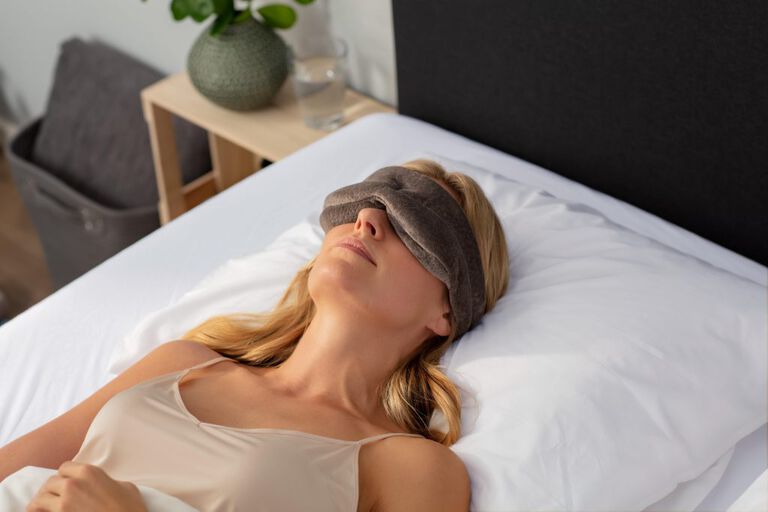HOW ALLERGIES CAN AFFECT YOUR SLEEP
When you suffer from allergies, you know they can strike day or night, leaving you to deal with a scratchy throat, nasal congestion, and sore, irritated eyes. While these symptoms can certainly be troublesome during the day, they can be even worse at night, preventing you from getting a good night’s sleep, so you feel even worse the following day.
Allergies can be caused by any number of factors, from dust mites and mould, to animal dander and pollen. While there is no way to completely avoid these irritants outside, you can control your exposure indoors. By making a few changes to your surroundings, you may be able to reduce your allergy symptoms, helping you to feel happier during the day, while enjoying better sleep at night.
WHAT ARE ALLERGIES?
It can be helpful to think of allergies as the result of mistaken identity. When an allergen enters the body, such as dust mites, pollen or pet dander, the immune system in those who suffer from allergies wrongly identifies it as a dangerous substance. Responding to this ‘attack’, the immune system makes antibodies to attack the allergen, which in turn, triggers a cascade of immune system reactions.
This includes the release of chemicals designed to destroy micro-organisms, the most common of which is histamine. In smaller amounts, histamine causes itching and swelling. In large amounts, the nearby blood vessels become dilated and the area swells with accumulated fluid.
Why do some people suffer from allergies while others do not? This overreaction of the immune system to harmless substances is thought to be genetic. As this genetic tendency is described as ‘atopy’, people who have allergies are ‘atopic’. These people usually have raised levels of immunoglobulin E (the antibodies created by the immune system to attack the allergen) in their blood.
While some people’s reaction to allergies can be seasonal, for example, those who suffer from hay fever, others have to deal with allergies year-round. Here are some of the most common types of allergies:
Pollen: As a seasonal allergy, pollen allergies are typically worse in spring and autumn, however, some people suffer from this type of allergy throughout the year.
Dust mites: Even the cleanest houses have dust – and in that dust, you will likely find dust mites. As dust mites feed off dead skin cells, one of their favourite places to be is in your bed, bedding and pillows.
Mould: If your house is damp, you may have issues with mould. This can be a problem overnight especially if you have a bathroom attached to your bedroom.
Pet dander: Pet dander is basically the flakes of dead skin that your pet sheds. If you have a dog or a cat, this can be a common allergen.
HOW CAN ALLERGIES AFFECT YOUR SLEEP?
When it comes to allergies and sleep, symptoms can cause all manner of problems for allergy sufferers. Sleep problems are common in people with allergies, with one study* finding that sleep is dramatically impaired by allergic symptoms, with the degree of impairment linked to the severity of those symptoms.
When you suffer from allergies, nasal congestion can make it difficult to breathe, especially when you are lying down. Other irritating symptoms, such as sneezing and coughing, a runny nose and irritated eyes can make it even more difficult to fall asleep and stay asleep as you toss and turn through the night, so you wake up feeling even worse than you did the night before.
A bad night’s sleep caused by allergies may result in headaches the following day, feelings of anxiety or depression, lack of concentration and even a lower libido. Sleep problems can also be linked with fatigue and daytime sleepiness, decreased productivity at work or school, impaired learning and memory, and a reduced quality of life.
Aside from issues with allergies and sleep deprivation, allergies and sleep apnoea can also be a common problem. Linked with allergies, obstructive sleep apnoea (OSA) is a sleep disorder that causes breathing to be briefly and repeatedly interrupted during sleep. This can cause severe daytime sleepiness and a range of chronic health problems such as heart disease and stroke.
STRATEGIES TO HELP YOU SLEEP BETTER WITH ALLERGIES
If you suffer from allergies and want to enjoy better sleep, there are steps you can take to help reduce your symptoms:
Pollen: People who suffer from pollen allergies may choose to take medication to reduce their symptoms, but the side effects of these medications can in fact be worse than the allergy symptoms themselves. For example, pseudoephedrine can keep you awake, and antihistamines can make you drowsy during the day. To reduce pollen in your bedroom, it can help to keep windows shut overnight, and to change the air filter on your air conditioning system regularly. A portable air purifier with a HEPA filter can also work to improve the air quality in your bedroom.
Dust mites: To reduce dust mites in your sleep space, you can wash your bedding in hot water, add a dust mite cover to your mattress and pillows, and vacuum your bedroom and mattress regularly. Showering before bed can help to get rid of dead skin cells that dust mites are attracted to, as can wearing clean pyjamas each night.
Mould: To avoid dampness creating mould in your home, you should keep air moving, especially in damp areas such as the bathroom. This can be done by opening a window or using an exhaust fan. Any visible mould should be dealt with immediately.
Pet dander: If you want to reduce pet dander at home, you may want to keep your pet off the furniture and out of the bedroom. You should also vacuum regularly, and brush and bath your pet weekly.
* https://www.ncbi.nlm.nih.gov/pubmed/16983053?dopt=AbstractPlus
Feel it for yourself
Find a TEMPUR store or Stockist and try out our range of mattresses for yourself

SIGN UP FOR THE NEWSLETTERS!
By signing up, you agree to receive TEMPUR Australia’s products, services, news, reviews and promotions by emails. For more information on how we process your personal data, please refer to our Privacy Policy.



